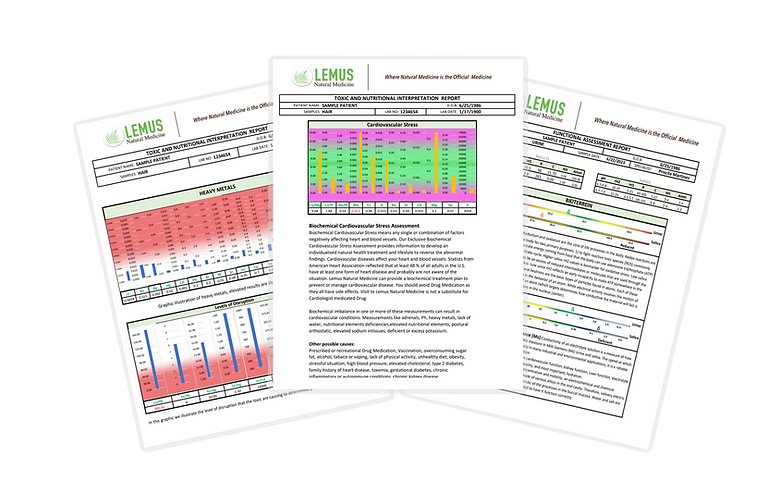Lemus Natural Medicine is a private health clinic that specializes in Natural Medicine and lider in exclusive Multidimensional Bioterrain Testing System.
At Lemus Natural Medicine, we uncover the root causes of illness- not just the symptoms. Using Dr. J. Michael Lemus's exclusive Multidimensional Bioterrain Testing, we analyze over 270 biochemical markers through advanced lab testing, tissue evaluation, and a 114- question Symptom Survey. This Integrative, data driven system identifies hidden imbalances, tracks progress with scientific precision, and guides real-time adjustments.
Each personalized plan is designed to restore balance naturally- using nutrition, lifestyle, and targeted therapies- free from synthetic drugs or chemicals. As Dr. Lemus says, "Illness cannot take hold in a balanced body".
As seen in:












With 47 years of expertise, we create precise Natural Medicine Plans—patients see results within 15 days.
What does our patients say?
Patients Testimonials

Karen
"The changes in me are phenomenal! I've lost 40 pounds in 120 days and i have boundless energy"
Paola
"En 15 dias de dieta y suplementos he visto resultados que no esperaba. ya no tengo ataques de ansiedad y la sensacion de cansancio disminuyo muchisimo"
Ruben
"🙌❤️ gracias infinitas Dios los bendiga"
Health manteinance
A balanced bioterrein supports overall health, resilience against diseases, and efficient bodily functions.
Disease Prevention
A healthy internal environment can prevent the onset of chronic diseases, infections, and inflammatory conditions.
Holistic Approach
Understanding and optimizing the bioterrein emphasizes a holistic approach to health, considering diet, lifestyle, and environmental factors.
Personalized Medicine
Tailoring treatments based on an individual’s unique bioterrein, including their microbiome, genetic makeup, and nutritional status.
Functional Medicine
Focuses on optimizing bioterrein through diet, lifestyle changes, and natural therapies to address root causes of health issues.
Preventive Health:
Strategies to maintain a healthy bioterrein, such as balanced nutrition, regular exercise, stress management, and avoiding toxins.
Conditions We Commonly Address
At Lemus Natural Medicine we restore bioterrain balance by addressing root biochemical imbalances—correcting nutrient, toxin, and metabolic issues to naturally support whole-body healing.
Breast, prostate, ovarian, uterine, skin, and other metabolic or degenerative cancers.
Still have questions?

_edited.png)
At Lemus Natural Medicine, we move beyond trial-and-error treatments to deliver evidence-based, personalized care. Using advanced laboratory testing, we analyze biomarkers to identify the root causes of health concerns rather than merely treating symptoms. This scientific approach allows us to design precise treatment plans tailored to each patient’s unique biology for effective and lasting results.
During each visit, we closely monitor your progress by observing cellular changes under an electron microscope, giving you the opportunity to see your cells and track improvements firsthand. You can even take photos to document your healing journey. A symptom survey further helps measure how you feel and guides any necessary adjustments to your plan.
Follow-up visits are key to long-term success. Through ongoing evaluations, lab testing, and patient feedback, we ensure treatments remain effective and responsive to your body’s needs. If progress slows, we modify protocols, adjust nutrition, and balance priorities to support continued improvement.
About Our Clinic
Located in Coral Gables, Florida, our clinic combines modern technology with a warm and inviting atmosphere. From the moment you walk through our doors, you’ll be greeted by our friendly staff and the calming ambiance of our beautifully designed space.

Our Team
At Lemus Natural Medicine, our specialists are an extension of Dr. Lemus himself. ach team member has been personally trained by him to master every phase of our unique system - from data collection, laboratory testing, and advanced microscopy to computer analysis, treatment explanations, and ongoing patient support.
They are not only highly skilled professionals but also dedicated guides who ensure that every patient fully understands their evaluation and treatment plan. By serving as Dr. Lemus' trusted voice and ears, our team provides clarity, care, and continuity - supporting your healing journey every step of the way.



.png)
.png)

.png)
_edited.png)

_edited.png)














